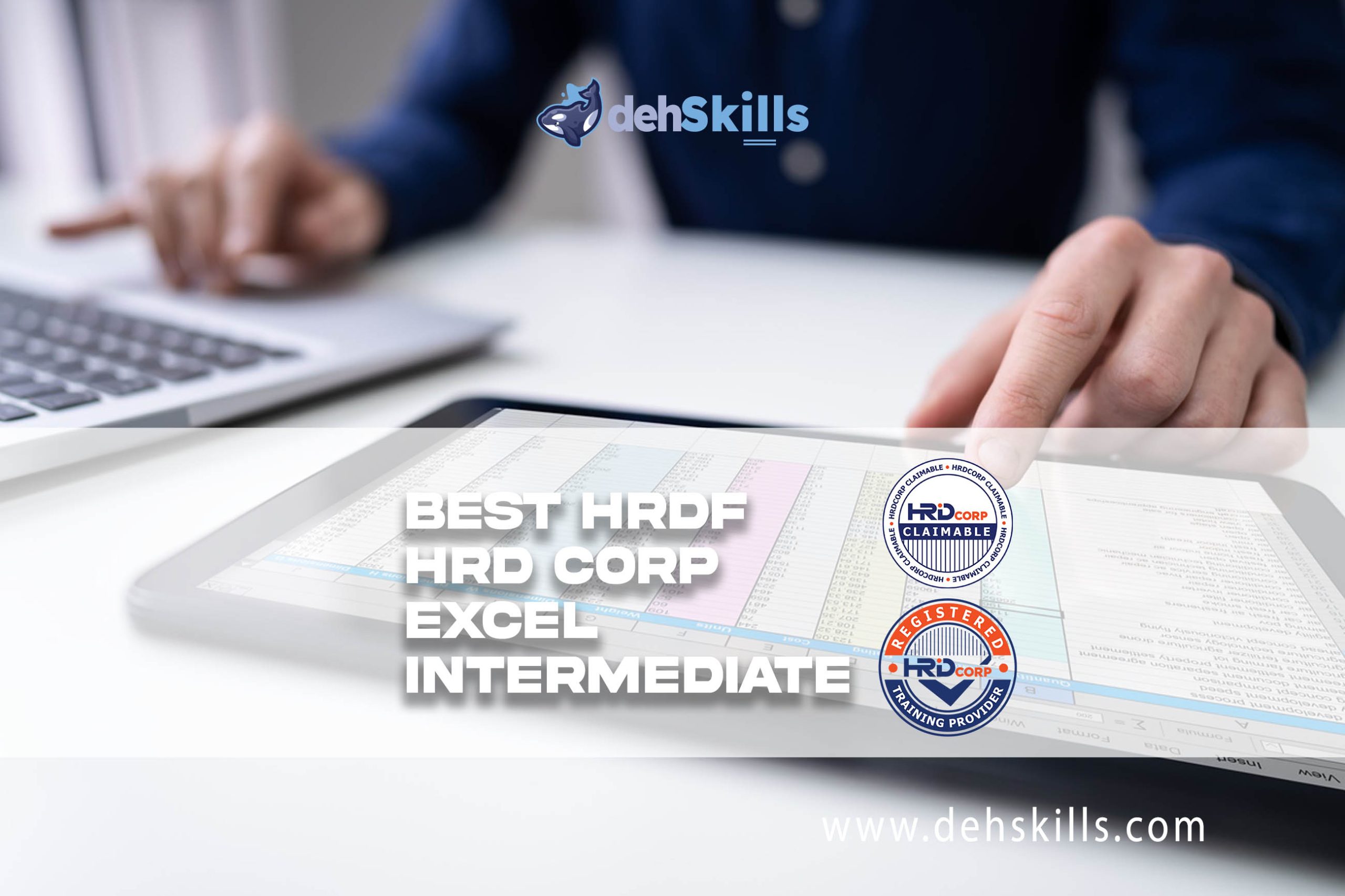
- This event has passed.
HRDF HRD Corp Claimable Excel Intermediate Training
September 2, 2024 @ 9:00 am - September 3, 2024 @ 5:00 pm
RM2400
HRDF HRD Corp Claimable Excel Intermediate Training
100% HRDF / HRC Corp Claimable Excel Intermediate Training
2-3 September 2024 – 9am till 5pm
Face-to-Face Classroom
Who should take this course?
This course is for people who have already learned the basics of Excel and want to learn more. For people who work with a lot of formulas and make reports, this course will help them learn how to use an electronic spreadsheet.
Pre-requisites
- A basic understanding of Microsoft Excel is a must, along with the following:
- able to move from one task to another
- Simple formatting for making a spreadsheet.
- be able to make a simple chart
- Add headers and footers to a spreadsheet and be able to print it.
- Able to use Auto Filter command
- The Freeze Pane command can be used.
- able to make simple formulas for adding, subtracting, multiplying, and dividing
- AutoSum, Count, Max, Min, and Average functions, as well as AutoSum, Count, and Count.
Benefits
- When this program is over, those who took part should be able to:
- Make formulas and functions ranging from simple to complex, such as:
- What COUNTA and COUNTIFS Do
- What Do AVERAGE A and AVERAGEIFS Do?
- How do SUMIF and SUMIFS work?
- IF Statement
- Nested Functions
- What a database does
- Validate data in a worksheet
- Filter data using Auto & Advanced Filtrers
- Formatting for advanced charts
- Clean duplicate records
- Visualizing data as a graphics
What’s in it HRDF HRD Corp Claimable Excel Intermediate Training
Unit 1: Making Math Problems
- Topic A – Reuse Formulas
- Related information
- Absolute references
- Different sources
- How to make sense of mixed cell references
Unit 2: Making more complicated formulas
- Topic A: How to Use Range Names:
- Putting names for ranges in the Name Box
- Using the New Name dialog box to add a range name
- Changing the name of a range and getting rid of a range name
- Formulas that use range names
Unit 3: Putting functions to work
- Using Statistical Functions (Topic A)
- What Does COUNTA Do?
- What Does COUNTIFS Do? What Does AVERAGEA Do?
- What Does AVERAGEIFS Do?
- Topic B: How to use math functions
- What SUMIFS Does
- Using a logical function (Topic C)
- IF Function Nested IF Function IFERROR Function
- Topic D: Using Functions in a Database
- Function of DSUM
- What Does DCOUNT Do?
- The Average Job
- What DMAX Does
- What DMIN Does
Unit 4: Using Tables to Set Up Worksheet Data
- Topic A: Making and changing tables Tables Table Parts
- Make a table in the dialog box
- Table tools let you create contextual tab styles and sets of Quick Styles.
- Changing how rows are shown Table change options
- Sort and filter data What’s the difference between sorting and filtering?
- Advanced sorting and filtering
- Removing duplicate values
- Use the subtotal function and database functions to figure out how much something costs.
- Topic D – Data Validation Validating your data
- Data Validation using Lists
- Data Validation using Date
- Data Validation using Formulas
Unit 5: Making graphs out of data
- Topic A: Formatting based on conditions
- Point out Cell Rules
- Using Data Bars
- How to Use Icon Sets
- Using Formula to come up with new rules
- Topic B: Make Graphs
- Charts
- Types of Charts
- How to put a chart in
- Getting bigger and moving Chart
- Adding additional data
- Changing from rows to columns
- Change and set up charts (Topic C)
- Formatting Chart elements is different from making changes to them.
- Minimize extraneous chart elements
- The tools for charts contextual tabs
- Putting together the chart in a style
- Putting a title on the chart
- Adding Sparklines (Subject D)
- How do Sparklines work?
- Adding Sparklines
- Sparkline Tools Tab
- Changing the data in a sparkline Taking out a sparkline
- E: Changing the Sparklines
- Putting data on display or not
- Getting a new look
- Changing the color of the sparkline and the marker
Unit 6: Managing Views
- Topic A: Using Custom View and Page Layout View Express Header and Footer to work with different views
- Topic B: Organizing Workbooks in Multiple Windows
- Putting two workbooks next to each other and looking at them side by side.
Complete the form to receive via email an official HRD Corp quote, course outline, trainer profile, trainer TTT, and HRD Corp TP certificate.
Autogenerate Quotation for Course
- Public Class
- On-Site Training
